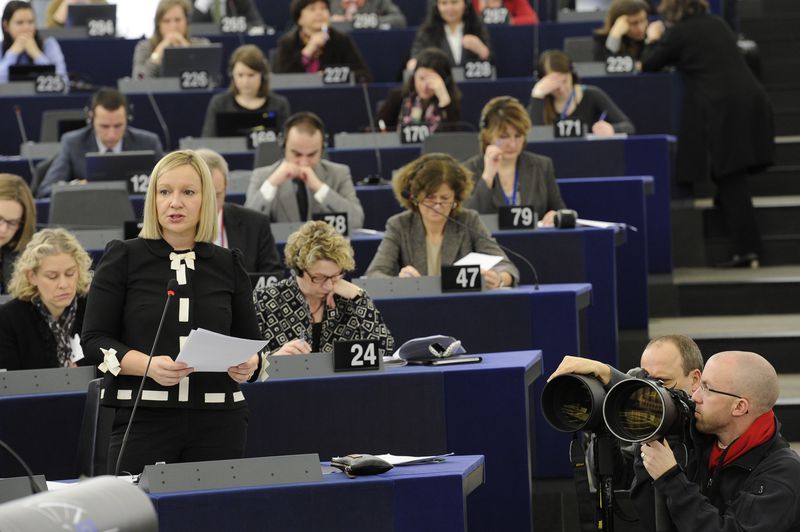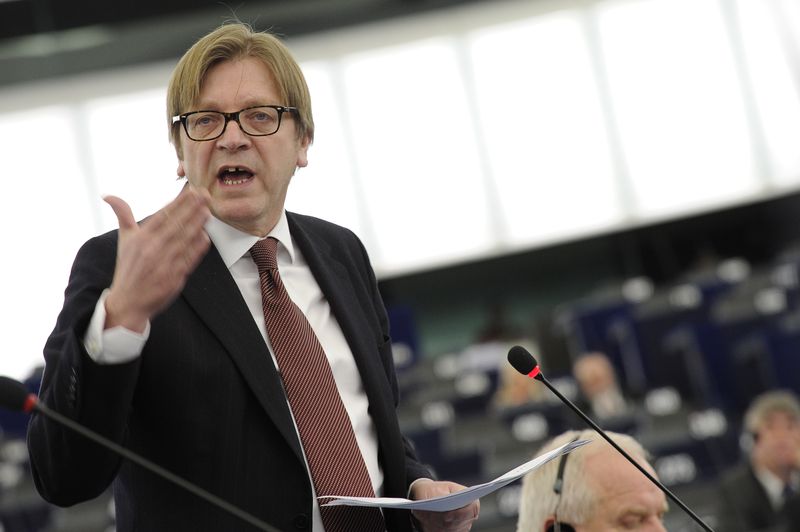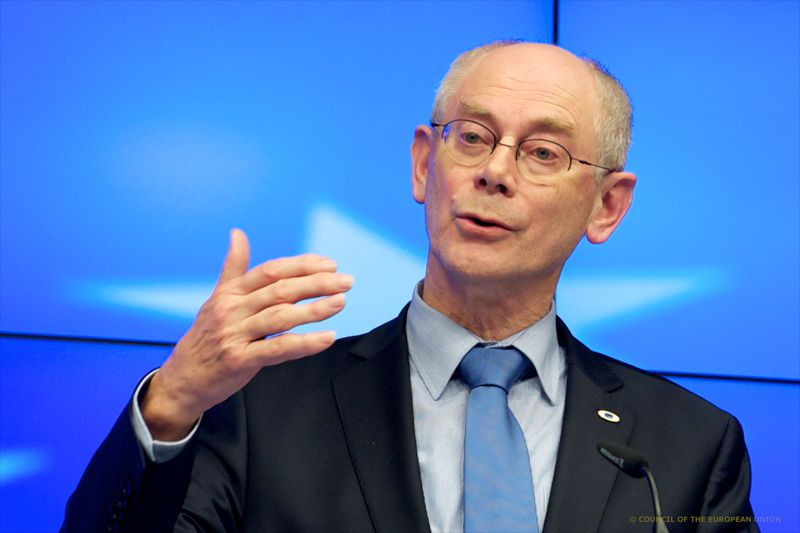The Commission Strikes Back
Adelina Marini, March 14, 2013
 As euinside predicted, the spring EU summit will turn into a battle field for the proponents of austerity measures and their opponents. While in the European Parliament a debate was taking place in Strasbourg on the upcoming summit and the EU's economic perspectives, the Commission stroke back at the International Monetary Fund and some member states and MEPs by publishing an analysis of the implications of belt-tightening policies.
As euinside predicted, the spring EU summit will turn into a battle field for the proponents of austerity measures and their opponents. While in the European Parliament a debate was taking place in Strasbourg on the upcoming summit and the EU's economic perspectives, the Commission stroke back at the International Monetary Fund and some member states and MEPs by publishing an analysis of the implications of belt-tightening policies.
The European Parliament is looking for a Plan B
Probably the proponents of austerity are happy that right at this point in time the rotation Presidency of the Council of the EU is being held by Ireland. On Wednesday morning Irish Minister of European Affairs Lucinda Creighton said that quite a lot has been achieved in the EU since the beginning of the crisis, but given the outstanding risks it is compulsory to stick to the agreed measures. She hoped that the heads of state and government will strongly support the five priorities the Commission has outlined in its Annual Growth Survey for this year and that they will continue with the national reforms. The five priorities are continuing with fiscal consolidation, recovery of normal lending of the economy, measures that boost growth and competitiveness, fight against unemployment, modernisation of public administration.
We are all very aware that there is a real public concern about the merits of these policies with some arguing that the costs are too high and that they are not working. As a person who comes from Ireland, I think I'm more than aware that fiscal consolidation has real and sometimes very difficult effects, said Lucinda Creighton and added that if we want to return to sustainable growth and jobs creation we have to continue restoring stability, which includes putting our finances in order as well. And this means, the Irish European minister underlined, structural reforms to continue as without them sustainable growth is impossible.
European Commission chief Jose Manuel Barroso, however, tried to explain that it is possible both the wolf to be satiated and the lamb to remain alive pointing out that short-term needs must be addressed, while in the same time this should not be for the sake of structural reforms. According to him, reforms aimed at improving competitiveness already deliver by correcting imbalances in the European economy, especially in programme countries. In that regard he, too, pointed out that Ireland was a brilliant example of that. Barroso recalled that only less than a year ago analysts predicted an implosion of the euro and today there is an improvement. Since the peak in 2009, budget deficits have been halved and they are expected to drop below the level of 3% as set in the Stability and Growth Pact by the end of the year. The interest rates many member states are paying have declined significantly and the current account imbalances are already being corrected, the European Commission chief reported.
But in spite of these good news, the immediate problem is unemployment, especially among the young people. Mr Barroso recalled that the Commission reacted quickly to this proposing to include a new measure in the budgetary framework for 2014-2020 in support of youth unemployment, worth 6 billion euros. In conclusion he said that a focus in the national reforms programmes of the member states should be structural reforms and measures to tackle unemployment.
The statements both of Barroso and Creighton, however, dropped on deaf years. The disputes that unfolded in the floor in Strasbourg went as far as Nigel Farage, British MEP and leader of the eurosceptic group Europe of Freedom and Democracy, to say that it is no longer possible to live under one roof with Bulgaria and Romania. Mr Farage fought at several fronts, clashing with the leader of the largest political group EPP as well. On the occasion of Farage's remarks during his speech, Joseph Daul said that although his or Farage's children were not among those who were queueing in front of the social kitchens "I do care about this". There is unemployment which reaches 60% in some countries, especially among the young people and this is why social and tax harmonisation is needed.
On behalf of the Socialists and Democrats spoke MEP Stephen Hughes (Britain)  who criticised the letter Jose Manuel Barroso sent some days ago to the heads of state and government. The European Commission is conducting not simply wrong economic policy, it is devastating, he said. Policy that is based on unjustified optimism. He put into question the reliability of the Commission's economic forecasts pointing out that initially a 0.6% growth was envisaged in the euro area, but the winter forecast expects recession of 0.6% (in the winter forecast it is envisaged the recession to be 0.3%).
who criticised the letter Jose Manuel Barroso sent some days ago to the heads of state and government. The European Commission is conducting not simply wrong economic policy, it is devastating, he said. Policy that is based on unjustified optimism. He put into question the reliability of the Commission's economic forecasts pointing out that initially a 0.6% growth was envisaged in the euro area, but the winter forecast expects recession of 0.6% (in the winter forecast it is envisaged the recession to be 0.3%).
The economy is currently working much worse than in 2011, the MEP added and pointed out that already Germany, France, Austria and The Netherlands are expected to have much lower growth. According to him, the crisis continued two more years and harmed the growth potential and "all what we hoped for from the structural reforms". In conclusion, the left deputy directly stated that he accused Barroso for "your harmful policy and wrong economic forecasts" and informed that the Commission web page, where the economic forecasts are, is nicknamed "Olli's madness".
In the same pessimistic spirit spoke Guy Verhofstadt as well, leader of the group of Liberals in the EP. He quoted a sentence from Barroso's letter to the leaders in which it is pointed out that the EU has not come out of the crisis yet, but is evident that the member states' reform efforts delivered. The former Belgian premier presented an assessment he made on the basis of the statistical data about the gross domestic product, the budget deficit and the government debt. According to that assessment, 7 member states are in recession, 9 are in a process of stagnation which means that growth is below 1 per cent, in 8 countries unemployment is over 8% and in Spain and Greece it is around 27%. Public debt and budgetary deficit are in violation of the Stability and Growth Pact in all member states, excluding Estonia and Luxembourg.
 In Greece the far right is rising, in Italy there is no government, in Cyprus banks are failing, in Spain there is a lost generation, Ireland is entering a sixth year of austerity, Guy Verhofstadt summarised the picture. Against this backdrop, an alternative to fiscal discipline is needed which should be in parallel to austerity measures and be based on solidarity, growth and investment. The liberal leader again presented his old ideas about a common debt redemption fund and eurobonds.
In Greece the far right is rising, in Italy there is no government, in Cyprus banks are failing, in Spain there is a lost generation, Ireland is entering a sixth year of austerity, Guy Verhofstadt summarised the picture. Against this backdrop, an alternative to fiscal discipline is needed which should be in parallel to austerity measures and be based on solidarity, growth and investment. The liberal leader again presented his old ideas about a common debt redemption fund and eurobonds.
The green leader, Daniel Cohn-Bendit (France) demanded an unemployment insurance to be paid by the EU for at least the first 6 months in countries like Greece and Spain which do not have social protection any more. In the EU budget can be secured a line to finance a minimum insurance, the deputy believes. But according to Martin Callanan, leader of the group European Conservatives and Reformists, sustainable growth cannot be achieved by injecting money into the economy. Nigel Farage again took part underlining that the most important political event was that 26% of voters voted for Beppe Grillo from the Italian eurosceptic party. Who is the comedian now, he asked and said that the eurozone membership is absolutely incompatible with democracy. The real problem you do not want to face is the situation of the French economy and that now France and Germany are going into different directions. A catastrophe is imminent, Farage predicted and added that the eurozone will fall apart.
He went even farther blaming everyone who refused to hear the truth about Bulgaria and Romania where corruption and organised crime were in command. These countries should not have been accepted to the EU in the first place and borders should remain closed for them. Bulgarian MEP Ivailo Kalfin demanded a blue card reminding Mr Farage that out of every 2000 people crossing the British border only 1 is a Bulgarian. Bulgarian students pay 13 million pounds every year for fees and living. In response, the British nationalist quoted data by the London police according to which 90% of the crimes in the UK capital were perpetrated by Romanians.
The Commission: measures deliver, but it will be better if we deepen integration
Against the backdrop of such an atmosphere, the economic general directorate of the Commission came up with a document-response to the working paper of the IMF chief economist Oliver Blanchard in which is admitted the relation between forecast errors and planned fiscal restrictions. "We find that, in advanced economies, stronger planned fiscal consolidation has been associated with lower growth than expected [...]", the document reads. This admission came as a double six for some EU member states who were forced to severely shrink their budget spending which led to a boom in unemployment. Such a vivid example is Greece.
But in its document, the European Commission addresses five allegations and  answers them in detail. In an attempt to defend the Commission policies, the authors of the document practically pass the ball into the member states' playground. Fiscal adjustment should be selected very carefully which often means to put a focus on restricting spending, but it is necessary to go beyond by choosing growth boosting measures. Such measures could be spreading the costs over the entire population avoiding to protect vested interests. A softening of the effect of austerity can be reforms in the pension system and the labour market.
answers them in detail. In an attempt to defend the Commission policies, the authors of the document practically pass the ball into the member states' playground. Fiscal adjustment should be selected very carefully which often means to put a focus on restricting spending, but it is necessary to go beyond by choosing growth boosting measures. Such measures could be spreading the costs over the entire population avoiding to protect vested interests. A softening of the effect of austerity can be reforms in the pension system and the labour market.
The price of reducing debt can also be softened by measures like creating effective bankruptcy procedures that will allow the normal lending of the economy to continue unhindered. The countries with EU/IMF programmes, both euro- and non-euro countries, also have space for manoeuvring. Good practises show that taxation measures with a focus on higher income groups leads to protecting from social benefit cuts and public wages those who are most vulnerable.
The Commission is taking advantage of the occasion to press ahead with Barroso's blueprint for deepening of the integration in the eurozone. The document points out that the entire conversation about how useful the austerity measures and the current policies are in fact have implications over the long-term improvement of the architecture of the Economic and Monetary Union (EMU). The current situation seems a good opportunity for the potential establishment of a "fiscal capacity" at central level. If you remember, this is an euphemism of a eurozone budget, used as in Barroso's blueprint so in German Van Rompuy's report, written in cooperation with the chiefs of the ECB, the Eurogroup and the Commission. The fiscal capacity, the document of Mario Buti and Nicolas Carnot reads, can be in the form of a stabilisation instrument as described in the blueprint.
This instrument could improve the conduct of fiscal policies in good times and cushion downturns. According to Lucinda Creighton, the member states' leaders will discuss how work is going on on all these issues with greatest focus on progress on the legislative process related to the establishment of the single supervisory mechanism for banks. No matter how will the negotiations take place in Brussels tonight, it is clear that the battle between austeritists and anti-austeritists will continue.
 | © EU
| © EU